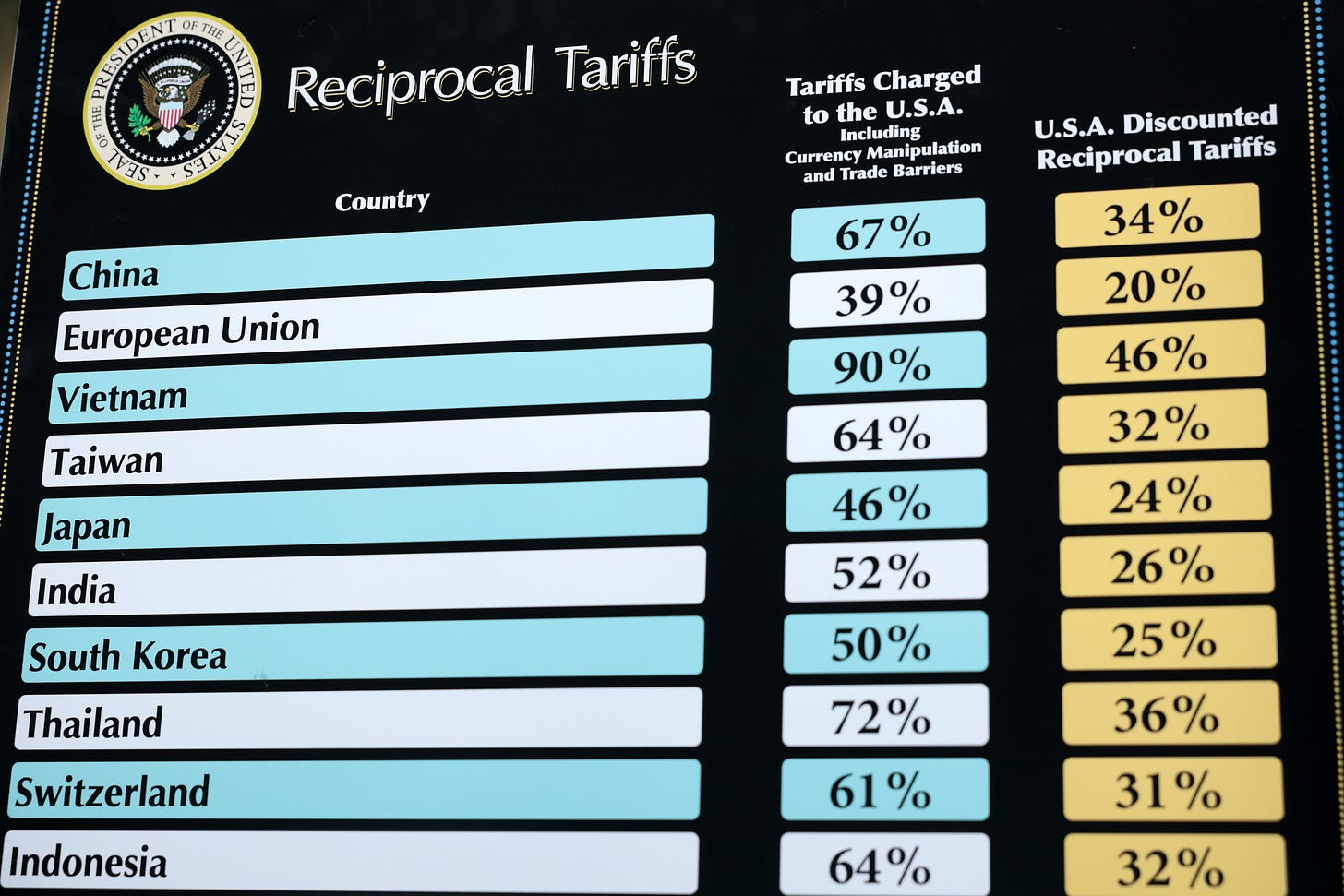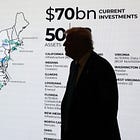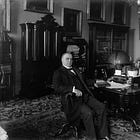Will courts let TACO steal tariff power from Congress?
The early returns aren’t promising for Tariff Man.
🚢 This free edition of Public Notice is made possible by paid subscribers. If you appreciate our fiercely independent coverage of American politics, please support us by clicking the button and signing up for a paid subscription. 👇
As with most issues, Donald Trump’s thinking on tariffs is, to put it charitably, muddled.
On the one hand, the self-styled “Tariff Man” promises that levies on foreign goods will usher in a renaissance of American industry as we all race to buy locally produced electronics, assembled by “an army of millions and millions of human beings screwing in little screws to make iPhones.”
On the other hand, he envisions an American government funded largely by tariffs, not income taxes, as in some wholly imagined halcyon yesteryear. (Does he think we all remember the Smoot-Hawley Tariff Act because it was such a rousing success?)
This second theory is premised on the lie that foreign producers, not American importers and eventually American consumers, pay tariffs. This would appear to undercut the idea that Americans will respond to tariffs by making and buying domestic goods — if there are no imports, then how is the government going to collect those trillions in tariff revenue? But no matter! Because in practice Trump uses tariffs in yet a third way, which is as a weapon to bludgeon other countries with until they agree to renegotiate trade deals in our favor.
That was the explicit promise of that preposterous Rose Garden ceremony back on April 2 where the president waved around a poster listing various “reciprocal” tariff rates on everyone from China to a couple of tiny Antarctic islands inhabited solely by penguins. The stated point of the exercise was to force other countries to the table.
"We're going to run 90 deals in 90 days,” White House econ crank Peter Navarro babbled on Fox Business, assuring the public that "the boss, is going to be chief negotiator.”
So far, the grand total is zero completed deals. Or perhaps half a deal, as an aggressively touted agreement with the UK that has yet to actually materialize. Turns out, threatening to destroy your allies’ economies if they don’t buy more Buicks is less effective than anticipated.
And so Trump has announced multiple delays and reversals as the stock market careened and his advisors warned that making good on his threats might spark a global depression. We are currently 50-some days into a 90-day “pause” on Trump’s “Liberation Day” tariffs. July 8 is the theoretical deadline, after which Vanuatu and Nauru and everyone else is in BIG TROUBLE MISTER … unless Trump backtracks again.
This maneuver has been dubbed the TACO, an acronym for “Trump Always Chickens Out.” But in the meantime, his plan to tariff the economy into greatness — again! — hit another snag as a court ruled that it’s wildly illegal.
Tariffs in court
It is axiomatic that Congress has the power to tariff. It’s right there in Article 1, Section 8 of the Constitution. But Trump cites a grab bag of emergency delegations from Congress to support his erratic tariff declarations. Mostly he relies on the International Emergency Economic Powers Act of 1977 (IEEPA), treating it as a more or less total delegation of Congress’s taxing authority. But no president has ever claimed such sweeping power, and Trump’s tariffs precipitated lawsuits in multiple courts.
The administration takes the position that Trump’s tariffs can only be challenged in the US Court of International Trade (CIT), a nine-judge body with specific jurisdiction over tariff disputes. Judges in California and Florida agreed, transferring lawsuits filed there to the CIT, which sits in New York. But if the administration thought it would get a warm reception there, it was sorely mistaken.
On May 28, a three-judge panel ruled that IEEPA “read in light of its legislative history and Congress’s enactment of more narrow, non-emergency legislation, at the very least does not authorize the President to impose unbounded tariffs.”
The court’s reasoning was based on two legal theories grounded in the separation of powers. The first is the non-delegation doctrine, under which Congress may not delegate its core functions to the executive branch.
“An unlimited delegation of tariff authority would constitute an improper abdication of legislative power to another branch of government,” the CIT judges wrote.
A note from Aaron: Working with brilliant contributors like Liz takes resources. If you aren’t already a paid subscriber, please sign up to support our work.
They also ruled that Trump’s interpretation of IEEPA would violate the major questions doctrine, a legal theory concocted by the Roberts Court to kneecap Democratic presidents. The idea is that some issues are so important that Congress must delegate authority to the executive branch explicitly. Conservative justices will define “important” and “explicit” on a case by case basis, and the EPA’s power to regulate coal plants is not it.
Here the panel said IEEPA contains no “explicit” delegation of Congress’s tariff power, and even if Congress had passed a law handing off its entire tariff authority, it would still be illegal. And so, however you slice it, IEEPA cannot be the blank check Trump is trying to cash.
Moreover, the court ruled that Trump’s invocation of emergencies is clearly pretextual. For instance, the “emergency” tariffs on Canada, Mexico, and China were putatively intended to combat the fentanyl “emergency.” But as the court notes, there’s no relationship between tariffs on imports and fentanyl interdiction.
“The Trafficking Orders do not ‘deal with’ their stated objectives. Rather, as the Government acknowledges, the Orders aim to create leverage to ‘deal with’ those objectives,” the panel observed, adding that “however sound this might be as a diplomatic strategy, it does not comfortably meet the statutory definition of ‘deal[ing] with’ the cited emergency. It is hard to conceive of any IEEPA power that could not be justified on the same ground of ‘pressure.’”
Finally, Congress passed Section 122 of the Trade Act of 1974 to empower the president to deal with trade imbalances. That law caps tariffs at 15 percent and limits them to 150 days. The Justice Department argued that Congress superseded that section of the law three years later when it passed IEEPA, but the judges weren’t buying it.
And so the court invalidated the vast majority of Trump’s tariffs. That ruling was appealed and put on hold, at least temporarily by the Federal Circuit Court, which sits in DC and presides over a mixed bag of cases including patent disputes, veterans benefits, government contracts, and appeals from the CIT. It issued an administrative stay last Thursday and ordered a lightning fast briefing schedule to be completed by June 9.
Notably, this stay was not based on the merits of the case or the likelihood of the government prevailing on appeal. In all likelihood, the judges hoped to avoid further whipsawing of the economy that might result from sudden changes via court order. But the prospect of courts cutting the legs out from under Trump’s shakedown scheme has made his bad hand even worse. Reuters reports that the US trade representative has drafted a letter instructing our trading partners to submit their best and final offers by today, detailing tariffs and quotas of American goods they will agree to purchase if Trump agrees to not torpedo their economies.
"Regardless of ongoing litigation concerning the President’s reciprocal tariff action in US courts, the President intends to continue this tariff program pursuant to other robust legal authorities if necessary, so it is important that we continue our discussions on these matters," the letter blustered.
In fact, those alternative legal authorities are not nearly so “robust.” That’s why Trump didn’t rely on them in the first place, and instead invented an emergency power to raise and lower tariffs by fiat.
What else is in the arsenal?
To justify steel levies in 2018, Trump relied on Section 232 of the Trade Expansion Act of 1962, which allows the president to impose product-specific import restrictions after an investigation by the secretary of commerce that it would boost national security interests. But that takes time and requires the secretary to show his work, which can then be challenged in court. Trump doesn’t want to wait for Howard Lutnick to dummy up an investigation; he wants the flexibility to sanction whole countries at the stroke of a pen.
Section 301 of the Trade Act of 1974 allows for country-specific tariffs. But like Section 232, it requires an investigation and public findings by the US trade representative that another country is discriminating against American exports or dumping products in the US.
Finally, some attorneys are suggesting that the president might rely on Section 338 of the Tariff Act of 1930, which permits the president to impose tariffs of up to 50 percent on imports from countries which “discriminate” against US exports. That authority has never been invoked, and the president’s claim that another country “discriminates” against the US would be vulnerable to challenge in court.
In short, if he can’t rely on IEEPA to steal Congress’s tariff power, Trump won’t be able to unilaterally impose tariffs of up to 1,000 percent, as he has threatened to do. His plan to reorder the global economy by rerunning a harebrained scheme that crashed the stock market and deepened the Great Depression 100 years ago will never come to fruition. All it takes is for five Supreme Court justices to sit on their hands and do nothing when this nonsense lands on their docket later this summer.
Amy, John, Brett … THINK OF YOUR LOVELY STOCK PORTFOLIOS!
That’s it for today
We’ll be back with more tomorrow. If you appreciate today’s newsletter, please support our work by signing up. Paid subscribers make Public Notice possible.
Thanks for reading, and for your support.






I value this Substack so much! I learn everyday from amazing writers and thinkers. Thank you for making this administration's foolery and evil (as some of their actions are ridiculous, while much is terrifying and evil) accessible and understandable.
As an Australian with no legal training I find this entertaining and enlightening....and cheering. But it occurs to me that it's all going to go to the Supreme Court and I have no confidence of this artfully packed body putting the law ahead of their political leanings.